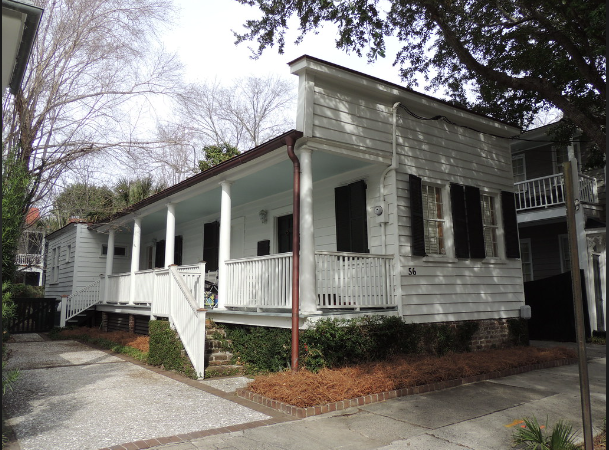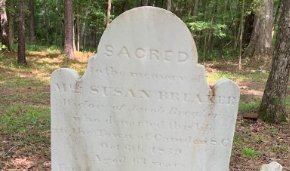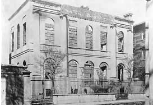
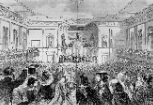
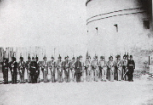

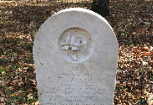
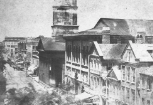
CHARLESTON WITHDRAWS INTO HERSELF
1821-1860
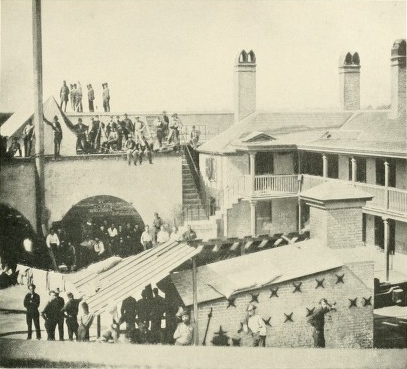
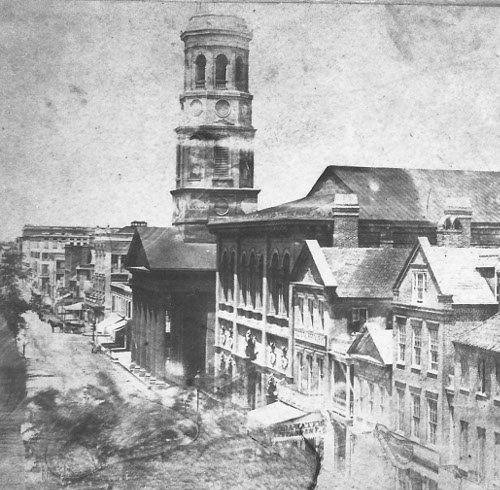
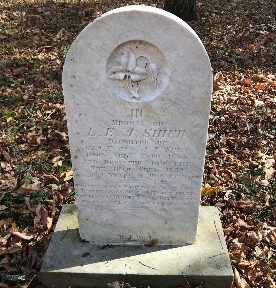
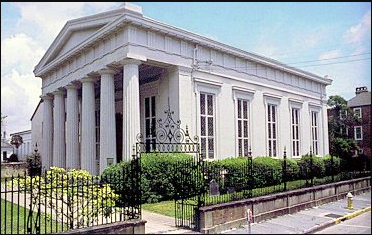
1822
July 2 -- Denmark Vesey and several others who had been convicted along with him for planning a slave rebellion were quietly hanged in the early morning hours for fear of a riot.
July 14 -- Bastille Day, the date that had been selected for the thwarted Denmark Vesey Rebellion.
Aug. 27 -- A hurricane estimated to be a Category 3 storm made landfall just north of Charleston, producing severe damage, mainly around the Santee River.
1824
Oct. 29 -- Charles Pinckney, the son of Col, Charles Pinckney and Ruth Brewton and an architect of the U.S. Constitution, died.
Nov. 21 -- The first Reform Jewish congregation in the nation was founded in Charleston by 47 members of the Kahal Kadesh Beth Elohim Synagogue.
1837
Jan. 20 -- Sarah and Angelina Grimke began the first of a six-week lecture series about slavery in New York Baptist churches. Though fiction, a great book about the Grimke sisters is The Invention of Wings by Sue Monk Kidd.
1838
Jan. 1 -- Osceola arrived as a prisoner at Fort Moultrie.
Jan. 30 -- Osceola died and was buried at Fort Moultrie.
Sept. 30 -- James Matthews shared horrific stories of being an enslaved person sent to the notorious "Sugar House" for punishment.
1839
Oct. 6 -- Susan M. Breaker died and was buried at the Bethlehem Baptist Church, where she had been an active member for 40 years.
Dec. 31 -- Jenny Lulu Lofton was born in Christ Church Parish.
1840
Feb. 9 -- Henry Michael Lofton was born in St. James Santee Parish.
1845
June 16 -- John Marion Lofton was born in St. James Santee Parish.
1847
Aug. 11 -- Benjamin Ryan Tillman Jr. came bawling into the world, the last of 11 children born to Benjamin and Sophia Tillman in Edgefield.
Nov. 19 -- Mary Ann Lofton was born in St. James Santee Parish.
1851
Dec. 31 -- Jenny Lulu Lofton was born in Christ Church Parish.
1854
Sept. 7 -- The Great Carolina Hurricane of 1854 made landfall south of Savannah as a large Category 3 hurricane.
Sept. 9 -- After two days the Great Carolina Hurricane weakened to a tropical storm as it crossed into South Carolina. Although most of the significant wind damage was south of Charleston, substantial storm surge flooding occurred well northward along the South Carolina coast ruining many crops. This was the first storm to hit the area since the keeping of official records.
Sept. 28 -- L.E.A. Shier was born to Aaron and Mary Shier in Goose Creek.
1857
Sept. 18 -- Sarah Ann Lowry Lofton died in Christ Church Parish.
Sept. 20 -- Samuel Herd Lofton died in Christ Church Parish.
1858
July 12 -- The Charleston Courier reported that "James Kennedy ... convicted of stealing a gold watch valued at $100 ... sentenced to be imprisoned one week, and then to receive upon the bare back, in the Jail yard, twenty stripes; afterwards to be imprisoned one week, and then discharged." (Source: Abode of Misery, p. 12)
Oct. 18 -- Eliza(beth) C. Walling Donnely died and was buried at Bethlehem Baptist Church, former site of the St. James Goose Creek Chapel of Ease.
1859
Sept. 10 -- L.E.A. Shier, sometimes known as the Trillium Angel, died aged four years, 11 months and 13 days, a victim of the "bilious fever" epidemic that was going around after an unusally hot, humid summer.
Sept. 11 -- L.E.A. Shier, 4, was buried at Bethlehem Baptist Church in Goose Creek.
1860
April 23 -- The Democratic National Convention, which turned out to be a disaster, convened at S.C. Institute Hall on Meeting Street.
April 30 -- Most of the Southern delegates to the Democratic National Convention, which was meeting in S.C. Institute Hall, walked out, feeling that their concerns regarding states' rights had not been heard.
May 3 -- After struggling unsuccessfully to find common ground, delegates to the Democratic National Convention called it quits, splitting the Democratic Party and paving the way for a relatively unknown Republican named Abraham Lincoln to succeed in his bid for the White House.
Nov. 7 -- News of Abraham Lincoln's election reaches Charleston, fueling the call of secessionists who give impassioned speeches at S.C. Institute Hall on Meeting Street.
Nov. 9 -- Two days after news of Abraham Lincoln's election as president, pro-secessionists stage a rally at the S.C. Institute Hall, next to the Circular Congregational Church on Meeting Street.
Nov. 14 -- Sparks from a polishing machine ignited a fire at the West Point Rice Mill, “brilliantly illuminating” the entire west side of the city, according to one newspaper account, and destroying the mill, its ancillary buildings, and more than 23,000 bushels of rice.
Nov. 25 -- The Rev. William O. Prentiss, in his sermon at St. Peter's Episcopal Church, referneced the threat of the "Wide Awake" groups, paramilitary organizations that formed in the North in the late 1850s and became closely affiliated wth the Republican Party and the presidential election of 1860. (Source: Confederate South Carolina)
Dec. 8 -- A South Carolina state delegation met with U.S. President James Buchanan, making him aware of the probability of the state soon seceding from the Union and hoping to negotiate a non-voilent transfer of properties owned by the federal government.
Dec. 10 -- A South Carolina state delegation met again with U.S. President James Buchanan, making him aware of the probability of the state soon seceding from the Union and hoping to negotiate a non-voilent transfer of properties owned by the federal government.
Dec. 20 -- South Carolina delegates vote unanimously for seccession at St. Andrew's Hall on Broad Street. The document was drawn up and signed later that evening before a cheering crowd at S.C. Institute Hall on Meeting Street.
Dec. 27 -- S.C. Gov. Francis Pickens mobilized local militia including the Washington Light Infantry, Palmetto Guard, Cadet Riflemen, and others who, over the next several days, seized the Customs House, Arsenal, forts Moultrie and Johnson, and other government properties. In what some say to have been the "real" start of the Civil War, the militia ousted a small group of civilian laborers and two Union officers from Castle Pinckney that day, making it the first Federal military installation to seized by the Republic of South Carolina.
Robert Gourdin, a prominent Charleston merchant, wrote a letter to his old friend Major Robert Anderson, who had evacuated his Federal troops from Sullivan's Island to Fort Sumter the previous day, expressing his profound sorrow over the major's decision to evacuate and protesting that the garrison had been in no danger at Fort Moultrie.
Major Robert Anderson notified U.S. Secretary of War J.B. Floyd that he had “abandoned Fort Moultrie because I was certain that if attacked my men must have been sacrificed, and the command of the harbor lost. I spiked the guns and destroyed the carriages to keep the guns from being used against us.” He said he had enough food, medicine, and military supplies for about four months. Despite their earlier orders to Anderson to hold whichever fort the major deemed safest, Buchanan and Floyd seemed surprised by news of the evacuation and called a cabinet meeting.
Dec. 28 -- U.S. President James Buchanan wrote using courteous, but firm language that he considered the seizures of the city's forts an act of hostility. The United States, he proclaimed, would hold Fort Sumter by all means possible.
S.C. Gov. Francis Pickens announced he would not allow any U.S. ship to enter Charleston Harbor. He ordered both the militia at Fort Moultrie and a small unit of Citadel cadets whom he had sent to Morris Island to enforce that order.
Dec. 29 -- U.S. Major Robert Anderson wrote to his friend, Charlestonian Robert N. Gourdin, saying "I have supplies of provisions, of all kinds, to last my command about five months, but it would add to our comfort to be enabled to make purchase of fresh meat and so on, and to shop in the city."
Dec. 30 -- Ten days after South Carolina seceded from the Union, the state militia seized the United States Arsenal in Charleston.
Dec. 31 -- U.S. President James Buchanan decided to send reinforcements to Maj. Robert Anderson, something he had been considering since early fall.
